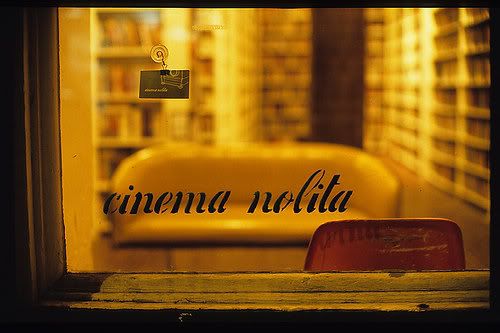Postcards of the Hanging
 Watchmen's trailers and billboard ads have proclaimed director Zack Snyder a visionary, but if there were any truth in advertising, they ought to promote the movie as coming "from the huckleberryish journeyman director of 300." Snyder deserves a hefty pat on the back for translating Alan Moore's rabidly beloved graphic novel to the screen under the pressures of fans whose expectations were almost as high as those of Lord of the Rings. I am not embarrassed to include myself among the hardcore Watch-geeks, and would have rather not see it get made at all than done badly. Generally speaking, I was impressed.
Watchmen's trailers and billboard ads have proclaimed director Zack Snyder a visionary, but if there were any truth in advertising, they ought to promote the movie as coming "from the huckleberryish journeyman director of 300." Snyder deserves a hefty pat on the back for translating Alan Moore's rabidly beloved graphic novel to the screen under the pressures of fans whose expectations were almost as high as those of Lord of the Rings. I am not embarrassed to include myself among the hardcore Watch-geeks, and would have rather not see it get made at all than done badly. Generally speaking, I was impressed.The story, for those who aren't in the know, takes place in an alternate 1985 where superheroes have existed since the 1930's and have helped win the Vietnam War, then subsequently driven into exile by president-for-life Richard Nixon. The murder of one such retiree, the Comedian, (a.k.a. Edward Blake,) sets off a domio chain of reopened old wounds among his former teammates: Nite Owl, an impotent Clark Kent type, Silk Spectre, a second-generation, superheroine dedicated to fighting the sexism her mother endured, Rorschach, a Travis Bickleish misanthrope with uncompromising beliefs, and Dr. Manhattan - the only member of the group with true superhuman powers - whose exposure to radiation transformed him into a god-like, Man Who Fell to Earth type.
Snyder introduces us to the alternate history timeline during the magnificent opening credits sequence, as the story of the original Minutemen is intercut in slow-motion, along with "what if" reinterpretations of the VJ-Day Times Square kiss,the Kennedy assassination and other events, to Bob Dylan's "The Times They Are A-Changin'." If Snyder's skill lies anywhere, it's as a condenser, taking only a few minutes, but never wasting a second, to convey things that take up almost entire chapters of Moore's novel. He doesn't have enough time delve into the psychological profiles of the characters as richly as they are conveyed in the book, but he and the cast do a splendid job in the time they're given. Patrick Wilson, in particular, makes Nite Owl the most three-dimensional character in the picture: a sad but empathetic dork who can't get it up unless he's just saved a bunch of people from a burning building. Jackie Earl Haley's turn as the filth-speckled, unhinged Rorschach is equally impressive, and Jeffrey Dean Morgan's Comedian, for the limited screentime he's given, is a testosteroney, trigger-happy scumbag that Sam Peckinpah would have loved.
My initial fears that Watchmen would turn into the same sort of endless cock-fest that 300 was were laid to rest early on in the picture. It seems that Snyder was truly humbled by his source material in both cases and strove to translate them as best he could, even though the rhythms and storytelling styles of Frank Miller and Alan Moore couldn't be further apart. Though Watchmen does contain the occasional slow-mo-fast-mo-slow-mo shot that Snyder is so very fond of, for the most part, the film's action sequences feel like an afterthought: the film is less a CGI-addled actionier than a hybrid of political thriller and contemporary noir that just happens to feature people in capes.
Snyder recreates some of the comic's most iconic images, such as Blake's assassin hurling him through his penthouse window, and Adrien Veidt seated before his dozen's of TV monitors in his Antarctic lair. He even includes several of the songs which are directly alluded to in the book, like Billie Holiday's "You're My Thrill" and Hendrix's "All Along the Watchtower." Such devotion is touching to see in a fellow Watchmen fan, although it does risk placing the picture in an odd kind of audience no-man's-land. Try as he might like to lovingly reproduce the comic in the cinematic form, time constraits dictate a lot must be left out, including, most controversially, changing the film's ending. No doubt a lot of fanatics will be angered at this, the same way every Lord of the Rings fan has their favorite part of the trilogy that was eliminated from Jackson's films.
On the other hand, Snyder's dogmatic faithfulness to the source material will no doubt alienate a lot of people unfamiliar with the source material. Aside from a really lame My Chemical Romance cover of Dylan's "Desolation Row," there is little attempt to reach across the aisle and draw some of the newbies into Watchmen's universe. At the Times Square AMC showing my girlfriend an I attended, there were several walk-outs some 20 minutes from the end: no doubt folks who dug The Incredible Hulk and Iron Man, who were hoping that the previous two hours of existential hubris, sexual neurosis, philosophical chatter and luminous blue penises would add up to a satisfyingly bone-crunching, action-packed climax. Watchmen's faithfulness makes it a treat for fans of the graphic novel, but it's also the reason why the picture never reaches to the level of The Incredibles, which used a similar outlaw-superhero plot to fashion an original story, or The Dark Knight, which really plumbed the depths of the philosophical implications of superheroes and supervillains. Watchmen is a limited film compared to these, but I still enjoyed it immensely, and I'm very glad it exists.


